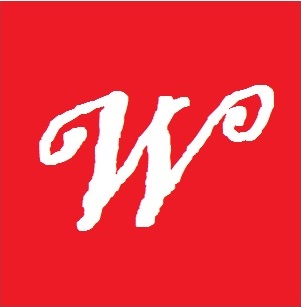 History of the
Vikings and Angles and Jutes and Saxons and
Welsh
and Mercians (who might be saxons, or might not) and Picts and
Hibernians and
Celts and so on.
History of the
Vikings and Angles and Jutes and Saxons and
Welsh
and Mercians (who might be saxons, or might not) and Picts and
Hibernians and
Celts and so on.
 History of the
Vikings and Angles and Jutes and Saxons and
Welsh
and Mercians (who might be saxons, or might not) and Picts and
Hibernians and
Celts and so on.
History of the
Vikings and Angles and Jutes and Saxons and
Welsh
and Mercians (who might be saxons, or might not) and Picts and
Hibernians and
Celts and so on.Wulfbertie thinks that a lot of history is very messy and badly organised. People in ancient times didn't need to make things so complicated. Here are some of the people who got mixed up.
Celts |
Romans |
Saxons and Other Germans |
Vikings |
Irish |
|
It all starts with Celts (at least as far as we know). They spoke Celtic. Sometimes they had tattoos and painted themselves blue with woad. Woad is a cross between wood and a toad. They were fond of Druids and Britain was covered in forests where there were wild pigs. There were also dragons. Apparently. At least in Wales anyway. Which wasn't called Wales. It was called Cymru, because only the Welsh could pronounce that properly. Because this confused non-Welsh people, the Welsh have been playing the same trick since. |
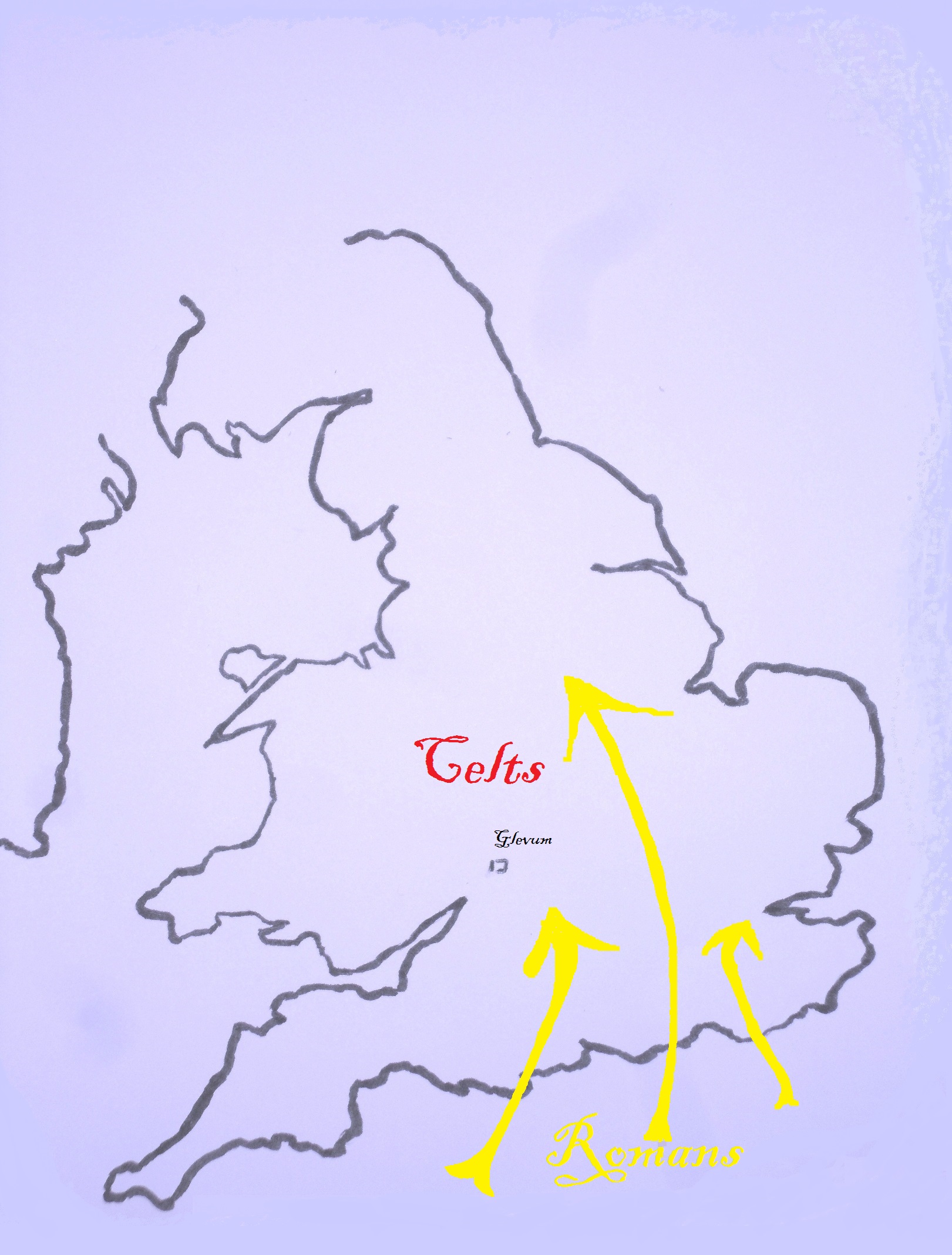 |
The Irish didn't get defeated by the Celts. In fact they were Celts. They liked fighting each other. |
||
|
The Romans were from Rome. They spoke Latin, which was clever of them. They also used Roman Numbrals which wasn't quite so clever. They came over from Gaul which is what they called France when the Gauls lived there. Gaius Julius (Caesar) came over first, took one look and went back to Rome. This was translated as Veni, Vidi, Fugi because he fudged it. Other Romans came back a bit later. They were led by a General called Agricola - which means Farmer. General Farmer defeated the Celts (quite a lot) as far north as Caledonia. Caledonia is what the Romans called Scotland when the Caledonians lived there. The Celts were still around. They were just sulking after being defeated such a lot. And having to learn Latin which is an annoying thing to have to do. The Romans founded Gloucester which they called Glevum to show off to the Celts just how well they spoke Latin. Eventually the Romans lost control of Rome, which confused them so most of them left. |
The Saxons were called Teutons. They were sitting on the Steppe being Teutonic. |
No one had heard of the Vikings at this point. |
The Irish didn't get defeated by the Romans. They just fought each other and sent the occasional raiding party to Glevum. |
|
|
When the Roman legions left Britain, the Celts decided it was time to take over again. But by this time some of them had become "civilised" which made it embarrassing to go back to wearing woad. These people called themselves Romano-British. They still had tattoos - but only on special occasions. They teamed up with the remaining Romans and renamed Glevum, "Glewchester" as a compromise and because they wanted to make glue and chests (Which are like caskets). In Wales they went back to being properly Celtic. They called Glewchester Caer Gloui because they were like that. Some people say that King Arthur built the world's first round table and lived in the middle of magical misty island called Avalon. Avalon might be near Glastonbury. If so - the mist might have been dry ice. |
The Saxons turned up in Northern Germany where they put down their towels to claim the land. They called their new land Saxony. This was not very imaginative. The people of Saxony are still proud of being unimaginative. |
|||
|
The Vikings turned up in Norway, living in Fjords. They were called Norsemen. Or sometimes Geats, Gutes or Swedes. |
The Irish didn't get defeated by the Romano-British. They just fought each other and sent the occasional raiding party to Glewchester. |
|||
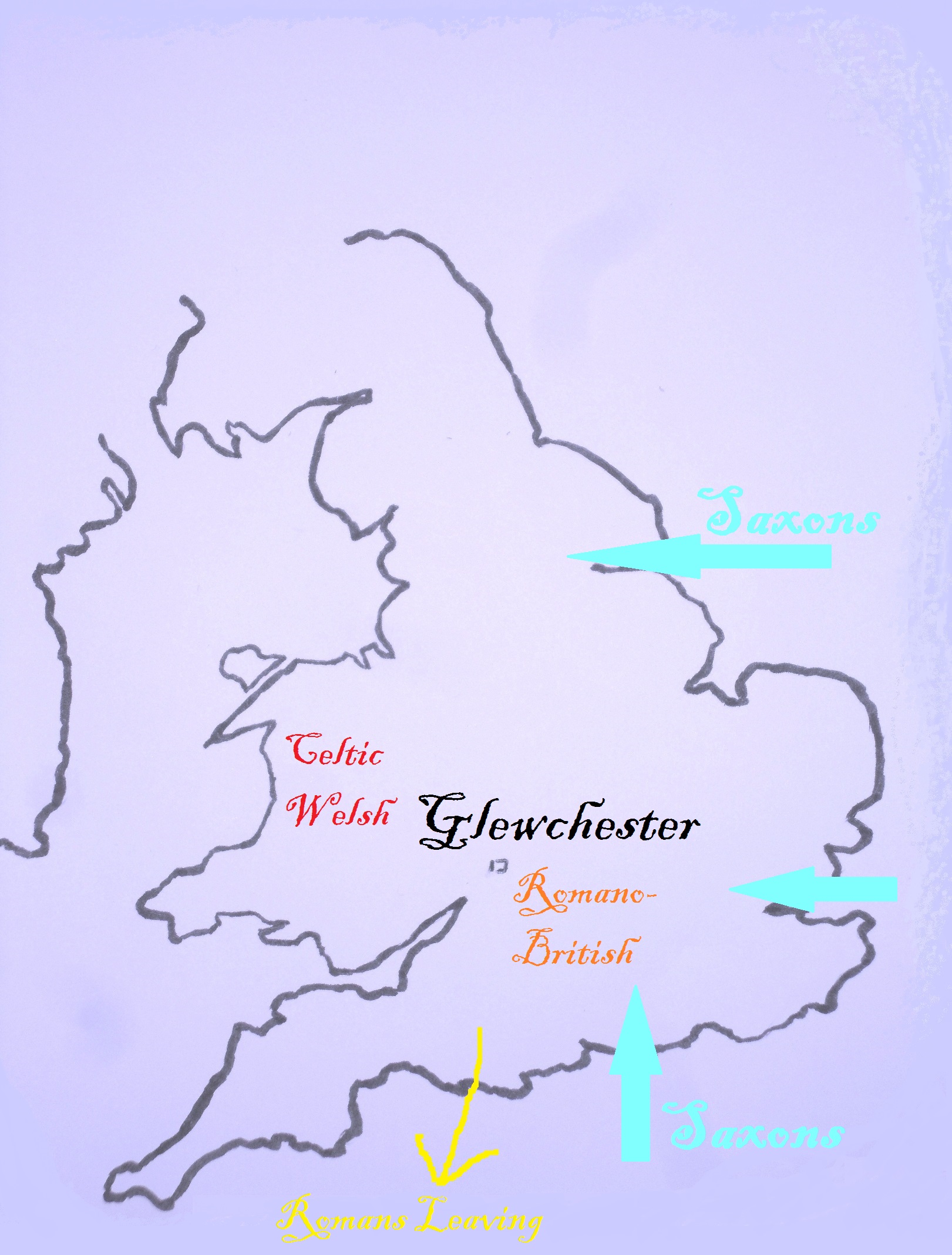 |
||||
|
The Saxons got turfed out of northern Germany for being too imaginative. So they went to Britain where the people were too civilised to put up much of a fight. They landed in the bit now called England, except at the time it wasn't. Some went to the East and called themselves East Saxons. Some went to the West and called themselves West Saxons. Some to the south - South Saxons. Some even went to the middle - Middle Saxons. None of them went to the north. This is why there were places called Essex, Wessex, Sussex and Middlesex but not Norssex. None of them went to Wales because they couldn't understand the directions. The Celto-Romano-British were still around. They were just sulking about being defeated. The First Saxons set up a little kingdom around Glewchester and called it Hwicca. Before long most people forgot whether they were Celts or Saxons. They started fighting against the people in the neightbouring valley regardless of who they were. Things got especially complicated when other Teutons from Germany followed the Saxons and got in on the game. These included the Jutes (who invented sacks), the Frisians (who had uncontrollable hair) and the Angles (who invented snooker). |
 |
|||
|
The Britano- Romo- Saxons living in Angle-land formed themselves into local sub-kingdoms. But the tiny kings had little kings upon their lands to fight them, and little kings had bigger kings and so ad infinitum. This is Latin meaning that by the time Angle-Land had been shortened to Eng-land there were only a small number of proper kingdoms. These included Wessex (in the west), Sussex (in the South) and Mercia in the midlands. The Welsh were exempt because they had princes not kings. People were also still scared of the dragons and wyverns. Glewchester had become Glewcaster because of the local accent. the Hwiccans had disappeared. Consequently Glewcaster was normally in Mercia. But sometimes it was in Wessex. |
The Vikings also decided to get involved. They had ships which were powered by tame dragons so they were very good sailors. There were no dragons left in Wales by this point. The Vikings turned up on the coast of Britain, which was now called Angle-land (because Saxony and Jutland already existed) where they stole things and burnt other things. They were particularly nasty to monks, who didn't like them. Sometimes they would abduct children to ransom back to their parents. In gneral they were a bit terrifying and wore helmets with horns on them. |
The Irish didn't get defeated by the Saxons or the Vikings. They just fought each other and sent the occasional raiding party to Glewcaster. |
||
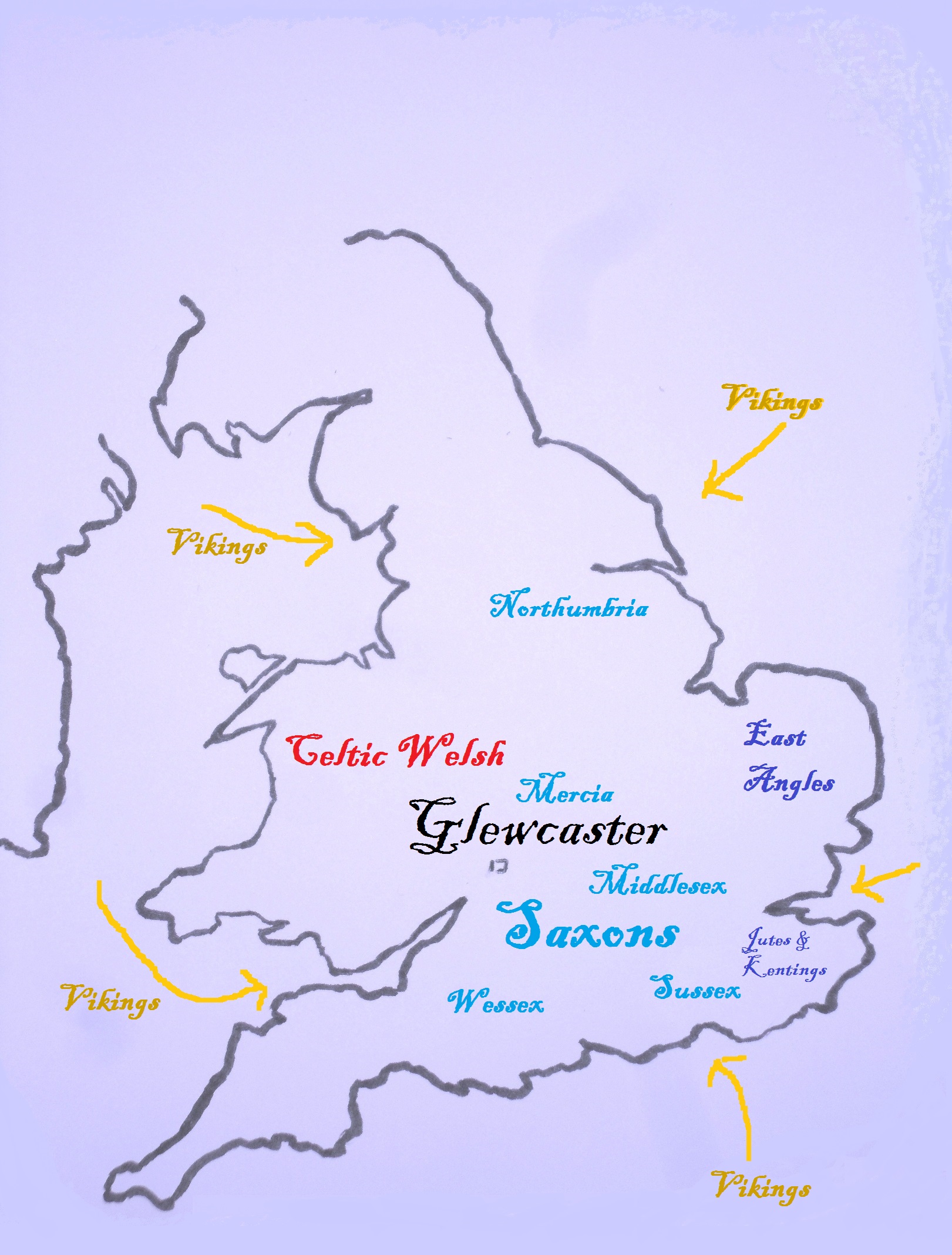 |
Around about this time the Vikings who were Norwegians and Norsemen decided to stop stealing and burning things and capture land to settle down on instead. Unfortunately, Viking means pirate, and pirates don't settle down. Since the Vikings needed a new name, they called themselves Danes which means Earl. They were very successful and conquered the whole of the East of what was now called England (including Essex). They did not conquer Glewcaster |
|||
|
The Irish didn't get defeated by the Danes. They just fought each other and sent the occasional raiding party to Glewcaster. |
||||
|
Eventually, a king of Wessex called Alfred defeated the Danes. For this reason he was great. His grandson was called Aethelstan becuase his parents were called Ethel and Stan. Aethelstan managed to merge all the Celto- Romano- Brito- Juto- Anglo- Dano- Saxon kingdoms into a sort of All- England- Alliance- kingdom. Aethelstan decided to die in Glewcaster because he couldn't think of a better place to die. By this point people called the town Glewster because they were lazy. Some years later Aethelstan's successor Harold lost the throne to a Norman. One in the eye for Harold. The Norman was called William. William was the descendent of a Viking called Rolf. Rolf had changed his name to Rollo so he could live in France. France had changed its name by this time because the Gauls, who were Celts, had been defeated by the Franks, who weren't. |
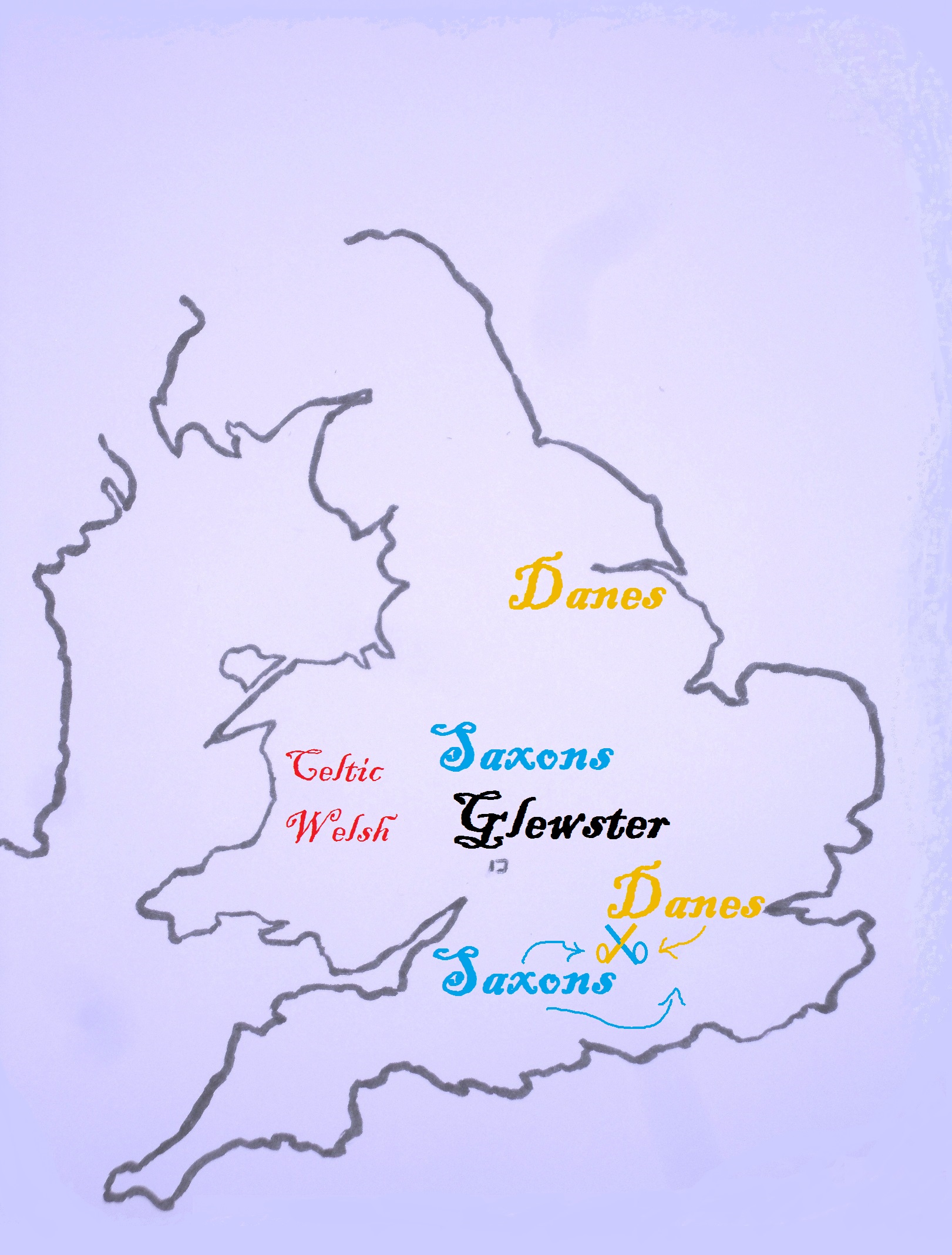 |
|||
| The Welsh continued being unrepentently Celtic. Just to prove the point they put lots of unexpected letters in their town names and waited for Rugby to be invented. |
The Irish didn't get defeated by the Normans. They just fought each other and sent the occasional raiding party to Glewster. |
|||
| THE REST IS HISTORY. | ||||
| Many of the things Wulfbertie saw in the dark ages are now in the Gloucester museum. | Wulfbertie supports Gloucester (Glewcaster) Cathedral | 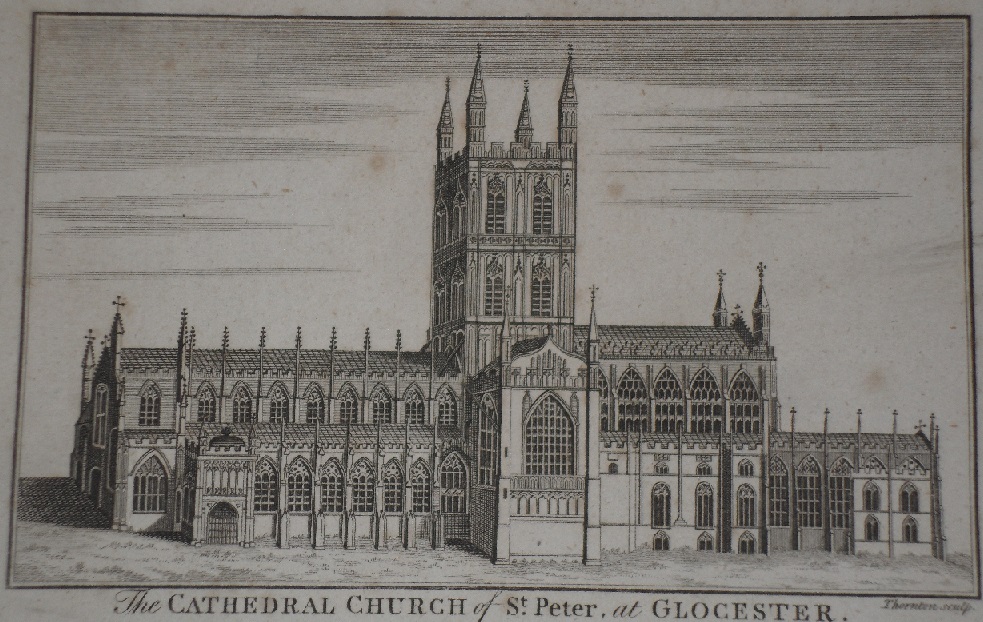 |
| All
drawings by Paul Evans. Extraordinary! |
 The Brothers,
Uncles, Beogren and other adults like to read clever
stories at Tilebury The Brothers,
Uncles, Beogren and other adults like to read clever
stories at Tilebury |
| About Wulfbertie | Amanita Peridot Festoon | Home | Wulfbertie Books | Paul Evans, Illustrator | Legal Notice |